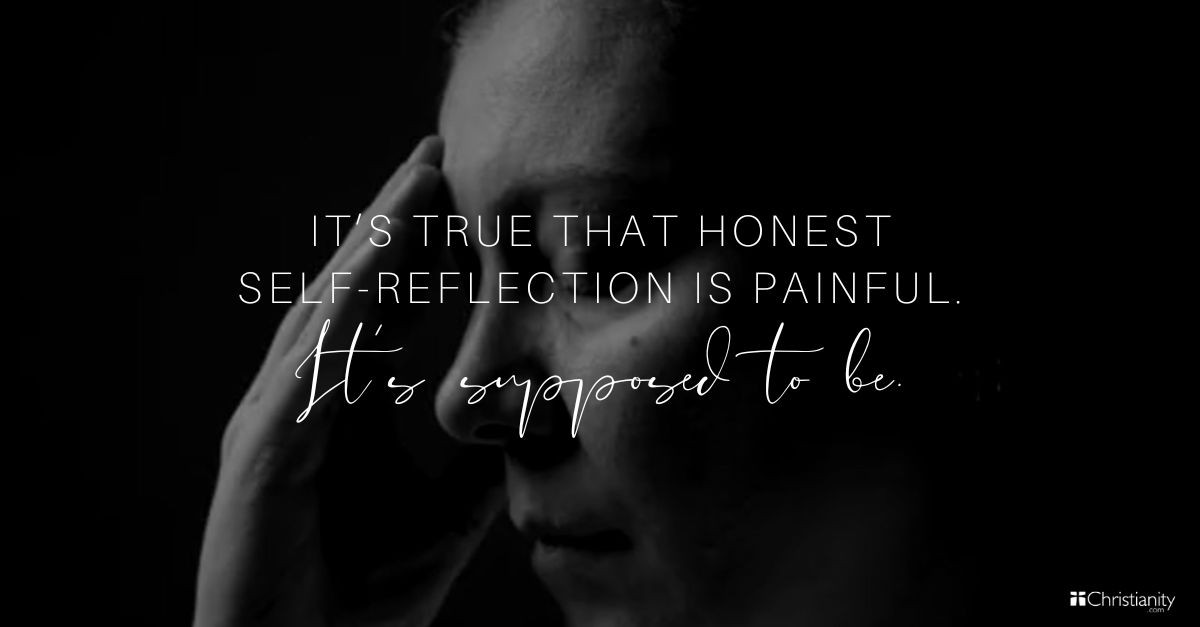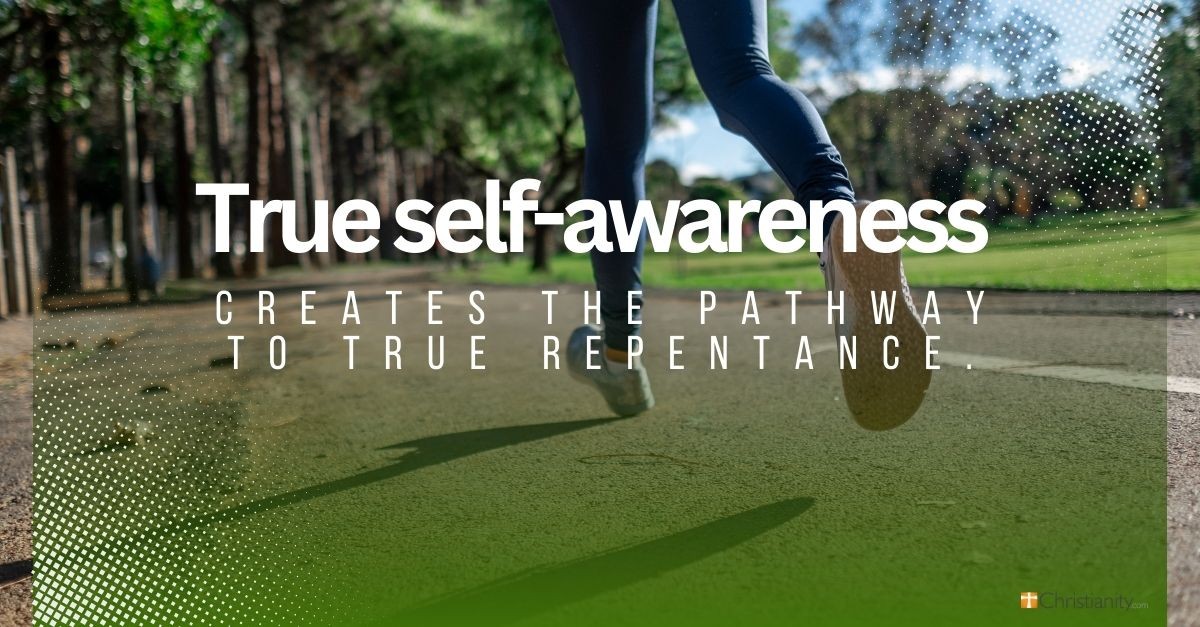
Self-awareness is a vital yet often misunderstood aspect of Christian growth. It doesn’t have to be about self-obsession but rather about seeing ourselves rightly to bring our full selves to the only One who can redeem what’s lost and broken. Self-awareness is not self-healing—quite the opposite, actually.
Here are six gospel truths that reveal the importance of knowing ourselves.
1. Self-Awareness Is Not Self-Centeredness
I am a third-generation pastor. Growing up in church circles, the idea of "knowing yourself" seemed suspicious, perhaps even heretical. It felt like a subject best avoided, hidden behind layers of language, much of it from Scripture itself, about how "self" was the root of all problems and self-centeredness only continues to run more rampant with each subsequent generation. The whole topic was labeled as dangerous territory. Self-awareness sounded like self-idolatry. And to be clear, that’s what it can become when not properly approached in a gospel context.
But over time, I came to see that, unknowingly, that perspective did not employ a holistic approach to Scripture. Self-awareness, or to use another term, self-realization, doesn’t have to be synonymous with self-centeredness. In fact, true self-awareness is the opposite of self-centeredness. Knowing yourself in light of the gospel enables you to continually elevate Christ to His rightful place at the center of your life. Without it, we remain blind to those areas where we, rather than Christ, still occupy the highest seat—a seat we’re unaware we’re warming.
Many Christians today either intoxicate themselves with self-centeredness or avoid knowing themselves altogether, terrified of what they might find. But we don’t have to cram self-awareness into a narrow box. Approaching it rightly—yes, biblically—can actually get us out of our own boxes, ways that dominate our thoughts and behaviors.
Photo Credit: ©Unsplash/Laurenz Kleinheider

2. Self-Knowledge Leads to God-Knowledge
John Calvin (1509–1564) profoundly observed, "Without knowledge of self, there is no knowledge of God," and conversely, "Without knowledge of God, there is no knowledge of self." Similarly, Thomas Aquinas (1225–1274) reminds us, "Well-ordered self-love is right and natural." In today’s faith culture, these ideas could easily be misconstrued. The truth is, knowing ourselves rightly means refusing to hate that which Jesus loved so much He was willing to die. Loving our “selves” well is not the same as narcissistic self-delusion or entitlement. It means having the courage to be painfully honest about our flaws and the judgment we deserve because of them, yet also joyfully honest about the pain Christ suffered to redeem us from that punishment.
The alternative is living from reactive event to reactive event, never fully knowing why we always tend to think and act in certain ways. Carl Jung (1875–1961) said, "Until you make the unconscious conscious, it will direct your life, and you will call it fate." But how can we know what we don’t know or see what we can’t see? As a disciple, life in Christ offers you the daily answer as “God transform[s] you into a new person by changing the way you think” Romans 12:2 NLT). Without this self-awareness, we remain prisoners to our blind spots, unconsciously repeating patterns of sin and brokenness. We remain like Saul on his way to Damascus. However, when the light of Christ’s grace throws us to the ground and reveals who we really are, everything changes—including, like Saul-turned-Paul, our very identities.
Photo Credit: SWN Design

3. Self-Deception Keeps Us Stuck
One of the greatest obstacles to self-awareness is the lie that says, “Knowing myself won’t change anything. I am what I am!" It’s an easy cop-out we’ve all used at one point or another. This mindset can manifest in statements like, "I’m just a jerk, that’s how I’ve always been," or social media memes that say, "If you don’t like me at my worst, you don’t deserve me at my best." Such ideas turn self-awareness into a justification for stagnation or worse.
The Bible warns us about this attitude. "There is a way that appears to be right, but in the end, it leads to death" (Proverbs 14:12 NIV). Yikes, that may sound harsh, but it’s actually a gift. Death comes in many shapes and sizes, not just the physical death we will all experience. We can be alive yet still experience some form of death. Being obstinate and self-confident without real self-awareness will lead us down many paths that seem right to us, but we will experience within ourselves a death of compassion, empathy, self-control, important relationships, and more. Like a broken compass, our inner sense of "rightness" often leads us straight into wrongness. True self-awareness reveals a need for the right compass—one outside of self— to expose our biases, brokenness, and need for change.
But how can we see ourselves? The gospel—and living it out in real community with others—are mirrors, showing us our true condition. To that end, Scripture consistently calls us to self-examination, which will require others outside of ourselves to do. Yes, we can choose to keep living in the Matrix, blissfully (though actually mostly dead) existing in a reality that isn’t real. 1 John 1:8 (NIV) reminds us, "If we claim to be without sin, we deceive ourselves, and the truth is not in us." A life denying one’s faults is a self-deception of the highest order.
Photo Credit: ©iStock/Getty Images Plus/FG Trade

4. Honesty Prepares Us for Grace
Another myth that stifles self-honesty is the fear that knowing myself will bury me under shame and condemnation. It’s true that honest self-reflection is painful. It’s supposed to be. In fact, if anyone thinks that fully knowing themselves has produced a wholly beautiful reflection, they haven’t yet found a true mirror of honesty. Real self-awareness isn’t about comparing yourself to others or convincing yourself, At least I’m not as bad as them. It’s about standing fully known before God and others. Hebrews 4:12-13 (NIV) says,
"For the word of God is alive and powerful. It is sharper than the sharpest two-edged sword, cutting between soul and spirit, between joint and marrow. It exposes our innermost thoughts and desires. Nothing in all creation is hidden from God. Everything is naked and exposed before his eyes, and he is the one to whom we are accountable."
Yet, this exposure doesn’t leave us hopeless. The grace of God meets us in our need, offering healing and transformation. Grace is easier to find when you see and believe all the ways you truly need it.
Photo Credit: SWN Design

5. Proverbs Guides Us Toward the Wisdom of Self-Awareness
The Book of Proverbs is a treasure trove of wisdom for those seeking self-awareness. The Proverbs are not meant to be predictable promises that work the same in each situation (after all, some say to speak up, and some say to be quiet). Proverbs isn’t a map for exactly where to hike; it’s a guide for how to hike wisely wherever you go in a broken world. The Proverbs reveal our tendencies toward pride, foolishness, and self-deception, but they also show us the path to wisdom. Wisdom cannot come without self-awareness, which shows us our need for it in the first place.
Proverbs 26:12 (NIV) warns, "Do you see a person wise in their own eyes? There is more hope for a fool than for them." Proverbs has a lot to say about fools, so this is pretty huge statement. Of all of the fools in a book describing fools, the fool who has the least amount of hope is the one who isn’t self-aware, becoming wise in their own eyes. Self-awareness begins with humility, acknowledging that we don’t know everything. Proverbs 11:2 (NIV) echoes this: "When pride comes, then comes disgrace, but with humility comes wisdom." Wisdom is not about intelligence or having all the answers; it’s about waking up to the limitations of self and recognizing our need for God’s guidance.
Photo Credit: ©Joel Muniz/Unsplash

6. Self-Awareness Leads to Repentance and Restoration
Self-awareness is not an end unto itself. We need not become paranoid and obsessed with improving ourselves and call it self-awareness. Rather, it’s the door to repentance, transformation, and alignment with God’s ways. It’s about waking up and realizing who and where you are, no matter where it is.
In Luke, the Prodigal Son had just such a moment of coming to himself. “But when he came to himself, he said, ‘How many of my father's hired servants have more than enough bread, but I perish here with hunger!’” (15:17 ESV). Before he had come to himself, he was in a filthy, pathetic pig pen, still thinking he was right. Then, in an instant, he woke up, suddenly becoming willing to do something he had not been willing to do in months or even years: run home to the very Father he had sinned against. He knew the Father’s worst was still better than anything else he could experience. What he got instead was the Father’s best.
True self-awareness creates the pathway to true repentance. If we don’t know we’re sick, we won’t listen to a doctor. If we don’t know we’re lost, we won’t ask for a map. And if we don’t know we’re dying, we won’t take hold of life.
“Whoever has been forgiven little loves little.” - Luke 7:47 NIV
Yet when we’re fully aware that we need big forgiveness, it leads us to big love for God and others. May we have the courage to look in the mirror of Scripture and community, acknowledge our blind spots, and humble ourselves in joyful alignment with the wisdom of God. The more we come to know ourselves in the light of these truths, the more we will come to know God better and more authentically. A life spent following Christ is a life-long journey into deeper self-awareness and, by proxy, deeper grace to cover and heal what we progressively and willingly uncover and then fully and confidently entrust to Christ.
A Prayer for Wisdom and Light
"Grant us, in all our doubts and uncertainties, the grace to ask what You would have us to do, that the Spirit of wisdom may save us from all false choices, and that in Your light we may see light, and in Your straight path may not stumble." –Book of Common Prayer
Listen to John's Podcast! This Week's Episode: Self-Awareness vs Unhealthy Navel-Gazing: What's the Difference?
"Until you make the unconscious conscious, it will direct your life, and you will call it fate." - Carl Jung. Self-awareness is a double-edged sword. Too much of it and you can become an introspective navel gazer. But at the same time, as John Calvin said, "without knowledge of self, there is no knowledge of God." In this episode, John and Jonnie talk about what healthy self-awareness looks like versus unhealthy navel-gazing. While we aren’t able to control everything that happens to us, we are given some agency in some aspects of life - and good therapy and healthy self-awareness can help us see the difference. And this isn’t just humanism - understanding yourself is part of understanding the gospel. If you laughed out loud listening to this episode, be sure to subscribe to Talk About That on Apple and Spotify!
Photo Credit: SWN Design via Canva Pro

Listen to John's Podcast! A nerdy humorist at heart, John is a former History teacher who has been featured on Good Morning America and numerous other shows and podcasts. On his weekly podcast, Talk About That, John goes toe-to-toe with best friend and comedian Jonnie W. in hilariously real and genuinely insightful conversations about life, history, current culture, faith—and everything in between. He earned a B.A. in History and a M.S. in Curriculum and Instruction from the University of Tennessee. He lives near Nashville with his wife and daughter, where he has served as an executive and teaching pastor at The Church At Pleasant Grove for over twenty years.
Originally published Friday, 24 January 2025.
